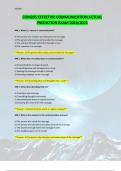Exam (elaborations)
COM205 EFFECTIVE COMMUNICATION ACTUAL PREDICTION EXAM 2024/2025
- Course
- COM205
- Institution
- Grantham University
COM205 EFFECTIVE COMMUNICATION ACTUAL PREDICTION EXAM 2024/2025 ### 1. What is a source in communication? a) The person who receives and interprets the message b) The person who creates and encodes the message c) The pathway through which the message is sent d) The response to a message **An...
[Show more]



